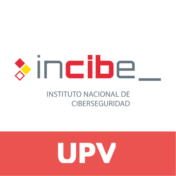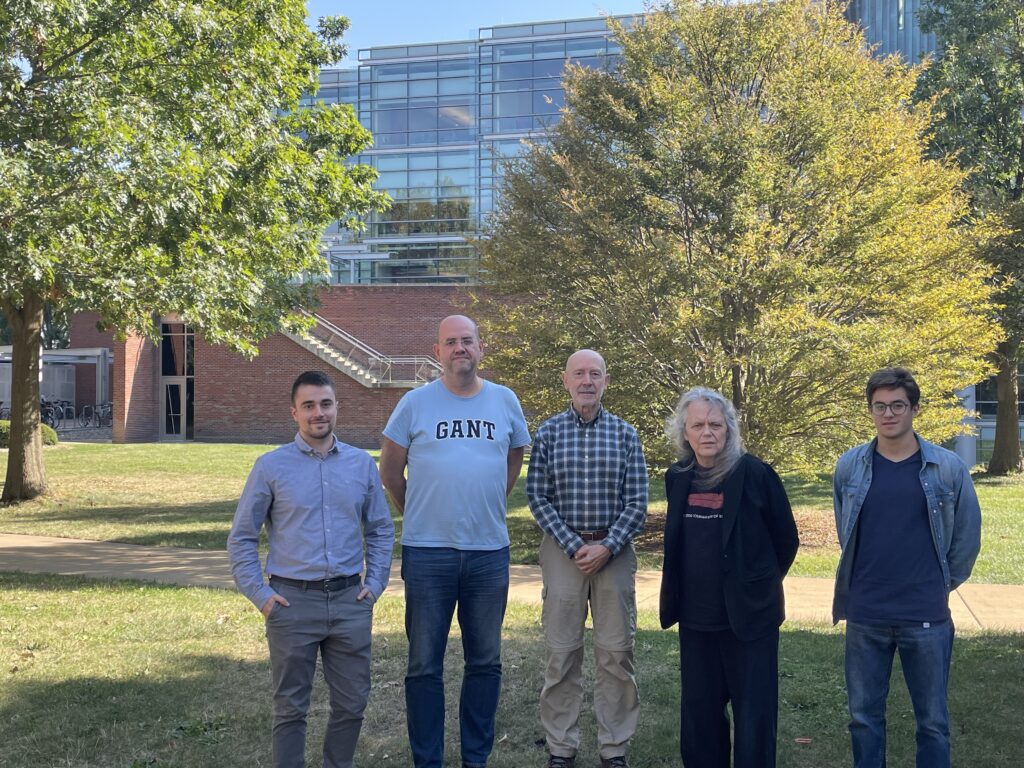
Víctor García Valero y Enrique Gallifa Tronch have started working with the development team of the Maude-NPA cryptographic protocol analysis tool formed by Catherine Meadows, José Meseguer and the director of the INCIBE-UPV Chair, Santiago Escobar, who is directing their doctoral theses
València, October, 15, 2024.- The American cryptographer, Catherine Meadows, senior researcher at the Center for High Security Systems of the Naval Research Laboratory and director of the Formal Methods area of this laboratory in the USA, together with the professor of the University of Illinois Urbana-Champaign (USA), José Meseguer, have received the researchers of the INCIBE-UPV Chair of Cybersecurity, Víctor García Valero and Enrique Gallifa Tronch, at this university.
This chair is part of the agreement between the National Institute of Cybersecurity (INCIBE), an entity under the Ministry for Digital Transformation and Public Function, through the Secretary of State for Digitalisation and Artificial Intelligence, and the Universitat Politècnica de València, included in the programme of Chairs of Cybersecurity in Spain, within the framework of the Recovery, Transformation and Resilience Plan, with funding from the Next Generation-EU Funds.
Both researchers, Víctor García Valero and Enrique Galifa Tronch, have recently started working on their thesis, whose director is also the director of the INCIBE-UPV Cybersecurity Chair, Santiago Escobar.
Both Víctor García Valero, who is spending three months at the University of Illinois at Urbana-Champaign (USA), and Enrique Gallifa Tronch, who has travelled there, have started working with the development team of the Maude-NPA cryptographic protocol analysis tool formed by Catherine Meadows, José Meseguer and the director of the INCIBE-UPV Chair, Santiago Escobar.
Leading international researchers
This collaboration of the INCIBE-UPV Cybersecurity Chair is one of the objectives of the Chair, which promotes international collaboration between young researchers and top international researchers in the field of cybersecurity.
Catherine Meadows has been a developer of tools for formal verification and automated discovery of faults in cryptographic protocols. She received her B.A. in 1975 from the University of Chicago and her Ph.D. in Mathematics from the University of Illinois at Urbana-Champaign in 1981. His thesis was on algebraic geometry. In May 2019, a symposium was held in his honour in Virginia, and a collection of essays was published.
José Meseguer received his PhD in Mathematics in 1975. In 1980 he joined the Computer Laboratory at SRI International, where he became Principal Scientist and Head of the Declarative Languages and Logic Group. He joined the University of Illinois in 2001 and is currently Professor of Computer Science, where he directs the Formal Methods and Declarative Languages Laboratory. He has worked especially on the design and implementation of declarative languages, including OBJ and Maude, as well as on rewriting logic. In 2019 he was awarded the Formal Methods Europe Fellowship. He is also an ACM Fellow, a programme founded in 1993 by the Association for Computing Machinery that recognises the top 1% of the world’s leading members in computer science.
Santiago Escobar is part of the development team of the Maude-NPA cryptographic protocol analysis tool together with Catherine Meadows and José Meseguer. He is also part of the development team of the Maude modelling and programming language, together with José Meseguer and other researchers.
Cybersecurity Chairs Programme in Spain
INCIBE, within the Global Security Innovation Programme, has the particular mission of raising cybersecurity capabilities and resources in the academic, business and technological ecosystems, aimed at boosting the cybersecurity capabilities of society and the economy in general. The aim of this initiative is to have a programme that seeks to promote and generate knowledge and its transfer to the productive sector, especially by establishing synergies between the social and economic spheres of cybersecurity. With the aim of developing this purpose, the public invitation for collaboration in the promotion of cybersecurity chairs in Spain was launched on 1 December 2022.
The initiatives and actions of the Cybersecurity Chairs programme in Spain are included in the Global Security Innovation Programme, included in the Recovery, Transformation and Resilience Plan (PRTR) through Component 15. Investment 7 Cybersecurity: Strengthening the capacities of citizens, SMEs and professionals and boosting the sector. It acts especially in three of the six key aspects of the industry listed in milestone 245 of the PRTR: boosting the national cybersecurity industry for the emergence, growth and development of companies in this sector; developing high value-added solutions and services in the field of cybersecurity; and training and developing specialised talent in the field of cybersecurity.
About INCIBE
The National Institute of Cybersecurity is an entity dependent on the Ministry for Digital Transformation and Public Function, through the Secretary of State for Digitalisation and Artificial Intelligence, consolidated as a reference entity for the development of cybersecurity and digital confidence of citizens and companies. It is also a driving force for social transformation and an opportunity for innovation, fostering R&D&I and talent.
About UPV
The Universitat Politècnica de València (UPV) is, according to the Academic Ranking of World Universities (ARWU), known as the Shanghai ranking, the best technological university in Spain. More than 70% of UPV students are already working a year after completing their studies. And this is largely due to paid internships in companies. The UPV has more than a thousand agreements that allow student exchanges with other universities in Europe, Latin America, the United States, Canada, Australia, China and Japan. In its little more than 50 years of history, it has produced more than 145,000 scientific publications. It is a national leader in the number of patents and one of the Spanish academic institutions that obtains most income from its research activity.
Catehrine Meadows y José Meseguer reciben a investigadores de la Cátedra de Ciberseguridad INCIBE-UPV en la Universidad de Illinois Urbana-Champaign
Víctor García Valero y Enrique Gallifa Tronch han comenzado a trabajar con el equipo de desarrollo de la herramienta de análisis de protocolos criptográficos Maude-NPA que forman Catherine Meadows, José Meseguer y el director de la Cátedra INCIBE-UPV, Santiago Escobar, quien dirige sus tesis doctorales
València, 15 de octubre de 2024.- La criptógrafa estadounidense, Catherine Meadows, investigadora senior en el Centro de Sistemas de Alta Seguridad del Laboratorio de Investigación Naval y directora del área de Métodos Formales de este laboratorio en EE.UU, junto al catedrático de la Universidad de Illinois Urbana-Champaign (EE.UU), José Meseguer, han recibido a los investigadores de la Cátedra de Ciberseguridad INCIBE-UPV, Víctor García Valero y Enrique Gallifa Tronch, en esta universidad.
Esta cátedra es parte del convenio entre el Instituto Nacional de Ciberseguridad (INCIBE), entidad dependiente del Ministerio para la Transformación Digital y de la Función Pública, a través de la Secretaría de Estado de Digitalización e Inteligencia Artificial, y la Universitat Politècnica de València, incluida en el programa de Cátedras de Ciberseguridad en España, en el marco del Plan de Recuperación, Transformación y Resiliencia, con la financiación de los Fondos Next Generation-EU.
Ambos investigadores, Víctor García Valero y Enrique Galifa Tronch, han comenzado recientemente a trabajar en su tesis, cuyo director es el también director de la Cátedra de Ciberseguridad INCIBE-UPV, Santiago Escobar.
Tanto Víctor García Valero, que está realizando una estancia de tres meses en la Universidad de Illinois en Urbana-Champaign (EE.UU), como Enrique Gallifa Tronch, que ha realizado un viaje hasta allí, han comenzado a trabajar con el equipo de desarrollo de la herramienta de análisis de protocolos criptográficos Maude-NPA que forman Catherine Meadows, José Meseguer y el director de la Cátedra INCIBE-UPV, Santiago Escobar.
Investigadores internacionales de primer nivel
Esta colaboración de la Cátedra de Ciberseguridad INCIBE-UPV es uno de los objetivos de la Cátedra que promueve la colaboración internacional de jóvenes investigadores con investigadores internacionales de primer nivel en el ámbito de la Ciberseguridad.
Catherine Meadows ha sido desarrolladora de herramientas para la verificación formal y el descubrimiento automatizado de fallos en protocolos criptográficos. Se licenció en 1975 por la Universidad de Chicago y se doctoró en Matemáticas por la Universidad de Illinois en Urbana-Champaign en 1981. Su tesis versaba sobre geometría algebraica. En mayo de 2019 se celebró un simposio en su honor, en Virginia, del que se publicó una colección de ensayos.
Por su parte, José Meseguer se doctoró en Matemáticas en 1975. En 1980 se incorporó al Laboratorio de informática de SRI International, dónde llegó a ser Científico Principal y Jefe del Grupo de Lógica y Lenguajes Declarativos. Se incorporó a la Universidad de Illinois en 2001 y en la actualidad es Catedrático de Informática, donde dirige el Laboratorio de Métodos Formales y Lenguajes Declarativos. Ha trabajado especialmente en el diseño y la implementación de lenguajes declarativos, incluidos OBJ y Maude, así como en lógica de reescritura. En 2019 fue galardonado con el premio Formal Methods Europe Fellowship. Además, es “ACM Fellow”, un programa fundado en 1993 por la “Association for Computing Machinery” que reconoce al 1% de los miembros más destacados del mundo en informática.
Santiago Escobar es parte del equipo de desarrollo de la herramienta de análisis de protocolos criptográficos Maude-NPA junto con Catherine Meadows y José Meseguer. Y también es parte del equipo de desarrollo del lenguaje de modelado y programación Maude, junto con José Meseguer y otros investigadores.
Programa de Cátedras de Ciberseguridad en España
INCIBE, dentro del Programa Global de Innovación en Seguridad, tiene como misión particular la elevación de las capacidades y recursos en ciberseguridad, en los ecosistemas académico, empresarial y tecnológico, dirigidos a impulsar las capacidades en ciberseguridad de la sociedad y la economía en general. Esta iniciativa tiene el propósito de disponer de un programa que persiga la promoción y generación del conocimiento y la transferencia del mismo al sector productivo, especialmente estableciendo sinergias entre los ámbitos sociales y económicos de la ciberseguridad. Con el objetivo de desarrollar este propósito se lanzó el pasado 1 de diciembre de 2022 la invitación pública para la colaboración en la promoción de cátedras de ciberseguridad en España.
Las iniciativas y actuaciones del programa de Cátedras de Ciberseguridad en España se engloban dentro delPrograma Global de Innovación en Seguridad, contemplado en el Plan de Recuperación, Transformación y Resiliencia (PRTR) a través del Componente 15. Inversión 7 Ciberseguridad: Fortalecimiento de las capacidades de ciudadanos, PYMES y profesionales e impulso del sector. Actúa especialmente en tres de los seis aspectos claves de la industria recogidos en el hito 245 del PRTR: impulsar la industria nacional de la ciberseguridad para el surgimiento, crecimiento y desarrollo de empresas en este sector; desarrollar soluciones y servicios de alto valor añadido en el ámbito de la ciberseguridad; y formar y desarrollar talentos especializados en el ámbito de la ciberseguridad.
Sobre INCIBE
El Instituto Nacional de Ciberseguridad es una entidad dependiente del Ministerio para la Transformación Digital y de la Función Pública, a través de la Secretaría de Estado de Digitalización e Inteligencia Artificial, consolidado como entidad de referencia para el desarrollo de la ciberseguridad y de la confianza digital de los ciudadanos y las empresas. Además, es un motor de transformación social y oportunidad para la innovación, fomentando la I+D+i y el talento.
Sobre UPV
La Universitat Politècnica de València (UPV) es, según el Academic Ranking of World Universities (ARWU), conocido como ranking de Shanghai, la mejor universidad tecnológica de España. Más del 70% del alumnado de la UPV ya trabaja al año de haber finalizado sus estudios. Y ello se debe en buena medida a las prácticas en empresa que son remuneradas. La UPV mantiene más de mil convenios que permiten el intercambio de estudiantes con otras universidades europeas, de América Latina, Estados Unidos, Canadá, Australia, China y Japón. En sus poco más de 50 años de historia, ha producido más de 145.000 publicaciones científicas. Es líder nacional en número de patentes y una de las instituciones académicas españolas que más ingresos obtiene gracias a su actividad investigadora.

